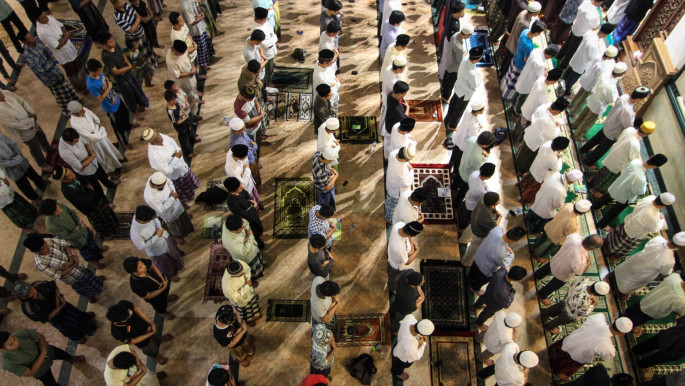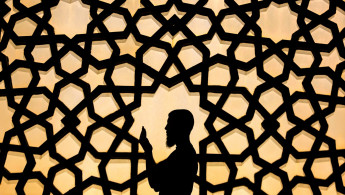How coronavirus has changed the way Muslims celebrate Ramadan
The spread of the coronavirus, however, has jeopardised one of the religion's most famous, important rituals: Ramadan, a month on the Islamic calendar during which Muslims fast from sunrise to sunset in commemoration of Muhammad's first revelation.
As the pandemic forces a growing number of countries into lockdowns, Muslims will have to reshape how they observe Ramadan, among the Five Pillars of Islam.
In early April, Egyptians began complaining that restrictions that their government had implemented to slow the pandemic, such as limits on mass gatherings, were also hindering preparations for Ramadan.
On 7 April, Egyptian authorities chose to enact a contentious suspension of Ramadan activities altogether, even forbidding groups from participating in Iftar, the supper during which Muslims break their fast together. The coronavirus has claimed hundreds of Egyptian lives.
 |
|
| Read more: Ramadan 2020: Keeping the faith in times of adversity |
Other countries in the Middle East have started to follow Egypt's example. On 9 April, Iranian Supreme Leader Ali Khamenei discouraged Iranians from gathering during Ramadan, suggesting that Iran might ban such assemblies outright.
Khamenei's admonishment seemed that much more striking in light of Iran's initial reluctance to acknowledge the severity of the coronavirus.
Iran downplayed the risks of the pandemic at first to avoid closing its economy and hurting its ties to China, a costly decision - over five thousand Iranians, including senior officials, have died.
Plenty of Muslims have encountered obstacles to observing Ramadan in the past. In Bangladesh, Rohingya refugees from Myanmar relied on donations from the international community to have enough food to break their Ramadan fast.
 |
As the pandemic forces a growing number of countries into lockdowns, Muslims will have to reshape how they observe Ramadan |  |
The Syrian and Yemeni civil wars, meanwhile, forced millions of Muslims to organise their celebrations around humanitarian crises. Across the world, Muslims suffering from eating disorders have wrestled with unique challenges on Ramadan.
The coronavirus differs from other difficulties that have faced Islam's adherents during Ramadan in that the pandemic affects every Muslim in every country at once. Whether spending the month in Islamabad or Idaho, Muslims must account for the lockdowns inspired by the pandemic.
The Muslim Council of Britain, adapting advice disseminated by the World Health Organization (WHO), has encouraged Muslims to join their families for Iftar through videoconferencing. In the United States, Muslims are debating how best to celebrate Ramadan in light of social distancing as they adjust how they administer other critical rites, foremost among them holding funerals.
In a nod to Ramadan's importance in the Muslim world, a few countries have attempted to find a balance between public health and freedom of religion. Egypt, Iraq, Lebanon, and Syria loosened their curfews to allow brief, small gatherings for Iftar.
 |
|
| Read more: Muslims in Asia brace for Ramadan in the shadow of coronavirus |
Other countries, however, have opted for more aggressive domestic policies. Indonesia has banned its citizens from leaving the country. Saudi Arabia, home to Mecca and Medina, has cancelled Ramadan prayers at its two best-known mosques in addition to issuing a suspension on pilgrimages to the kingdom.
In at least one case, clerics have challenged attempts to place restrictions on Ramadan. Imams in Pakistan called on their government to ease its lockdown after their followers clashed with police who had prevented a handful of mass gatherings.
Pakistani authorities relented, doing away with a requirement that mosques limit their attendance to five or less. The risky move comes at a time when Pakistani officials are fighting among themselves over how to handle the coronavirus.
 |
The longer the pandemic lasts, the more profound an impact it will have on one of the religion's most important traditions. |  |
As imams the world over determine the best ways for Muslims to participate in Ramadan amid a global pandemic, they may look for inspiration in Islam's more flexible provisions.
According to the religion's tenets, elderly, pregnant, and traveling Muslims may refrain from fasting - as can worshippers who suffer from an illness, who fear becoming ill from fasting, and to whom fasting would cause great hardship.
Given the difficulties that the coronavirus has imposed on Muslims in the Global South in particular, the pandemic may fulfil some Ramadan exceptions.
 |
|
| Read more: For Muslim converts, an isolated Ramadan under coronavirus lockdown is nothing new |
Several countries in the Muslim world are reopening their economics and societies little by little, introducing the possibility that their citizens could celebrate at least part of Ramadan together.
Bahrain, Iran, and the United Arab Emirates (UAE) have loosened a few of their many restrictions; with the exception of Iran, states in the Persian Gulf proved more proactive at slowing the pandemic than others in the Middle East. Malaysia also tried to ease its lockdown, then backtracked.
No two Muslim-majority countries will have the same experience with Ramadan during the age of the coronavirus. Even so, Muslims throughout the world are confronting a shared reality. This year, Ramadan will bear little resemblance to the celebrations that have coloured Islam's history for centuries.
The longer the pandemic lasts, the more profound an impact it will have on one of the religion's most important traditions. Whether refugees in Myanmar or community leaders in the United Kingdom, Muslims are changing how they worship because of the coronavirus.
Austin Bodetti studies the intersection of Islam, culture, and politics in Africa and Asia. He has conducted fieldwork in Bosnia, Indonesia, Iraq, Myanmar, Nicaragua, Oman, South Sudan, Thailand, and Uganda. His research has appeared in The Daily Beast, USA Today, Vox, and Wired


![President Pezeshkian has denounced Israel's attacks on Lebanon [Getty]](/sites/default/files/styles/image_684x385/public/2173482924.jpeg?h=a5f2f23a&itok=q3evVtko)



 Follow the Middle East's top stories in English at The New Arab on Google News
Follow the Middle East's top stories in English at The New Arab on Google News


